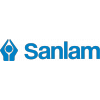- Report and monitor daily risk across a combination of business units. This includes but is not limited to: Market Risk Credit Risk Liquidity Risk Funding Risk Follow up on limit breaches and obtain explanations from the front office teams. Error and exception monitoring and follow-up. Assist with the production of management reports (fortnightly, monthly, and quarterly). Assist with quantitative modelling / projects etc
- BSc or BSc (Hons) in Mathematical / Statistical / Financial Maths / Financial Risk Management (FRM) / Business Mathematics / Quantitative Risk Management (QRM) / M Phil, or a similar qualification. This needs to include subjects which are technical / mathematical as well as its application to financial markets and concepts.
- Python coding skills and Murex knowledge will be advantageous.
Quantitative Risk Analyst - Sandton, South Africa - Sanlam

Description
Personal Attributes
Manages complexity – Contributing independently
Drives results – Contributing independently
Customer focus – Contributing independently
Cultivates innovation – Contributing independently
Who are we?
Sanlam Financial Markets ("SFM") is the business unit in Sanlam Group that is responsible for managing
shareholder credit, market, and liquidity risks, developing balance-sheet enabled products, and developing
solutions to optimize Sanlam's balance sheet(s) to generate shareholder value. SFM works closely with the
Balance Sheet Management function of Sanlam to assist the Balance Sheet Management Function in its
pursuit of optimising returns on the Sanlam balance sheet.
The role may be based at Sandton Alice Lane or Head Office Tygervalley.
What will you do?
Build valuation and sensitivity models from first principles
Qualification and Experience
2 - 4 years' experience in a similar role
Knowledge and Skills
Liquidity risk assessment programme
Business processes
Reporting and administration
Liquidity risk management
Quality, compliance, and accreditation
